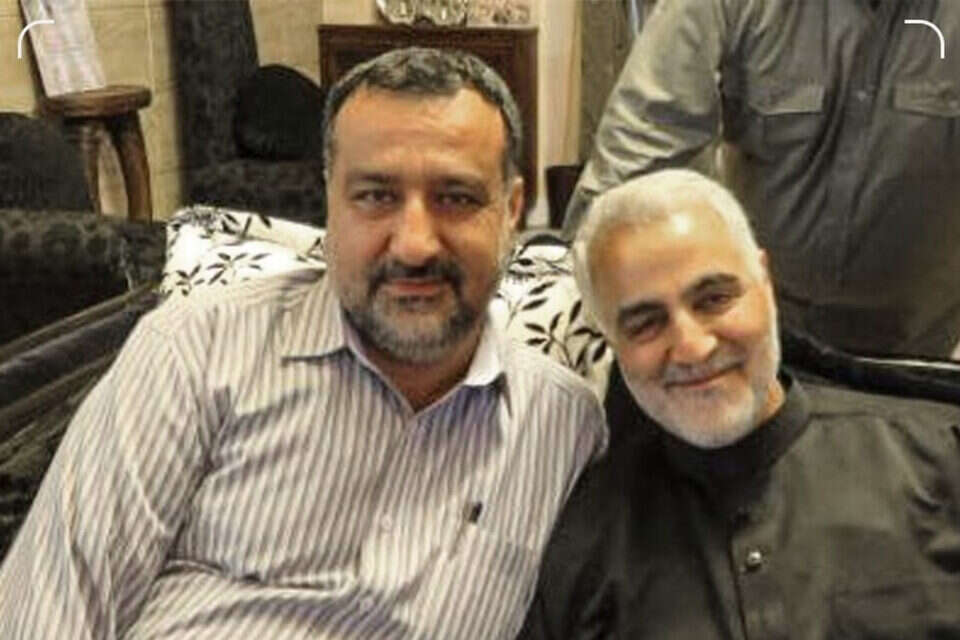The importance of killing IRGC operative Razi Mousavi exceeds the importance of the man himself. It shows that Israel, to which the assassination is attributed, has decided to step up its struggle – not only against Iran's proxies in the region, but also against Iran itself.
Mousavi was a mid-level commander in the Revolutionary Guards. He was involved in smuggling weapons from Iran, manufacturing weapons in Syria, and transferring money to Hezbollah and the Shiite militias operating under Iranian aegis in Syria. His rank (equivalent to brigadier general) and his position reflected less his importance and power, and more his closeness to Quds Force commanders – especially the mythological among them, Qassem Soleimani, who was assassinated in January 2020 in a US airstrike in Baghdad.
Liquidated within 3 years. Soleimani and Mousavi, photo: Arab networks
Israel has already been accused of attacking various Iranian elements in Syria. Sometimes there were deliberate assassinations in order to exact a price from Iran for its activity in the region, and sometimes it was the result of attacks on weapons depots or infrastructure that also included Iranian civilians or operatives. According to reports that arrived yesterday from Damascus, this was a targeted assassination with a dual goal: both to break with the man himself and to send a deterrent message to Tehran.
Visible ambiguity
Since the October 7 attacks, Iran has significantly increased its involvement in the arena. It assists Hamas in various ways – mainly with money, but also in frequent meetings with the organization's foreign leadership – and is an active partner in Hezbollah's campaign against Israel in Lebanon.
The Iranian proxies also operated in several cases from Syria, and parallel groups came from Iraq to reinforce activity on the borders of Syria and Lebanon. Another active arena is Yemen, where the Houthis rely on Iranian weapons and guidance to act against Israel by firing drones and cruise missiles, and attempting to attack Israeli vessels in the southern Red Sea.
Minister Galant in Northern Command, photo: Elad Malka
In response, Israel made sure to remain within the ambiguity zone in its actions against Iran, so as not to be dragged into a direct campaign against it, as was the case in the attacks carried out during the war against several targets related to smuggling and weapons production in Syria, as well as in the cyberattack that shut down most gas stations in Iran last week. This attack was attributed to Israel, even though responsibility for it was claimed by an organization called "The Predatory Sparrow."
Israel did not officially claim responsibility for the assassination yesterday, but no one in the region has any doubt who is responsible. This matter also requires a reexamination: Until now, Israel has operated within the framework of the campaign between wars in an attempt to remain below the threshold of war. At a time when open war is being waged in the north and south, and Iran is using many of the tools at its disposal to challenge Israel, it is necessary to examine whether the time is not ripe to remove some of this ambiguity in order to increase deterrence.
Decision required
Israel and Iran have been fighting each other in different ways for almost three decades. Until Black Saturday, Iran bled significantly more than Israel in every possible arena. The Hamas offensive and the regional struggle that ensued changed the picture. It is Israel that is bleeding today, partly with open Iranian encouragement and assistance, while Iran itself pays a negligible price on its soil.
Yesterday's assassination was likely intended to send Tehran a message that Israeli patience also has its limits. It is not certain that Iran will take it at face value, and it is possible that it will only spur it to increase its activity and try to exact a price from Israelis and Jews around the world. This is a regular Iranian effort carried out in dozens of places around the world, which has so far been thwarted thanks to impressive activity by the Mossad and various security services, but which may also have a glass ceiling given Iran's determination.
Therefore, it seems that Israel will soon have to deal with the real debate: whether to openly attack Iran on its soil. This is a complex decision that has costs in every possible aspect – security, political, economic, and regional – but it also has the real potential to deter Tehran, or at least cause it to engage more in defense and less in offense.
Wrong? We'll fix it! If you find a mistake in the article, please share with us

